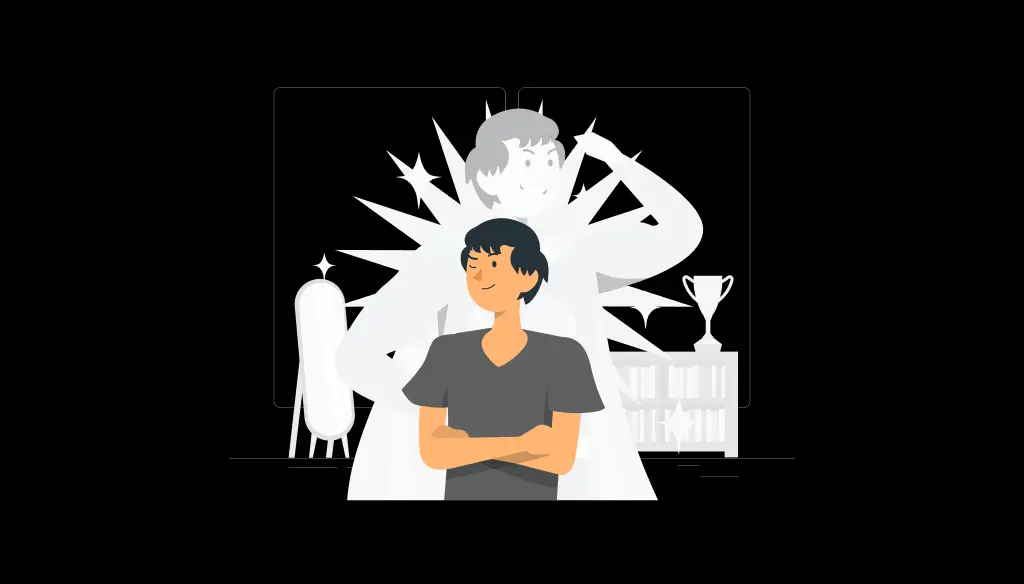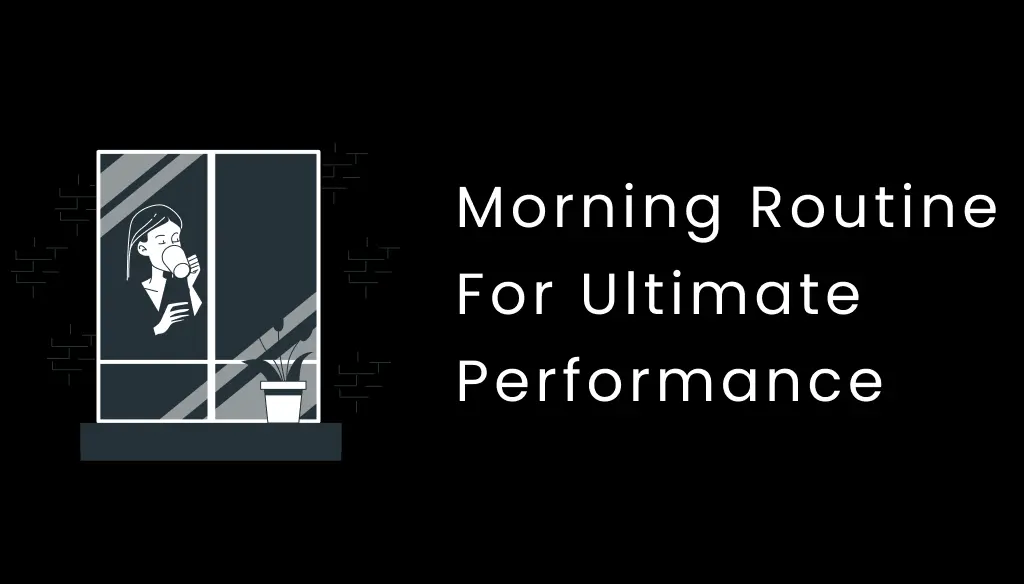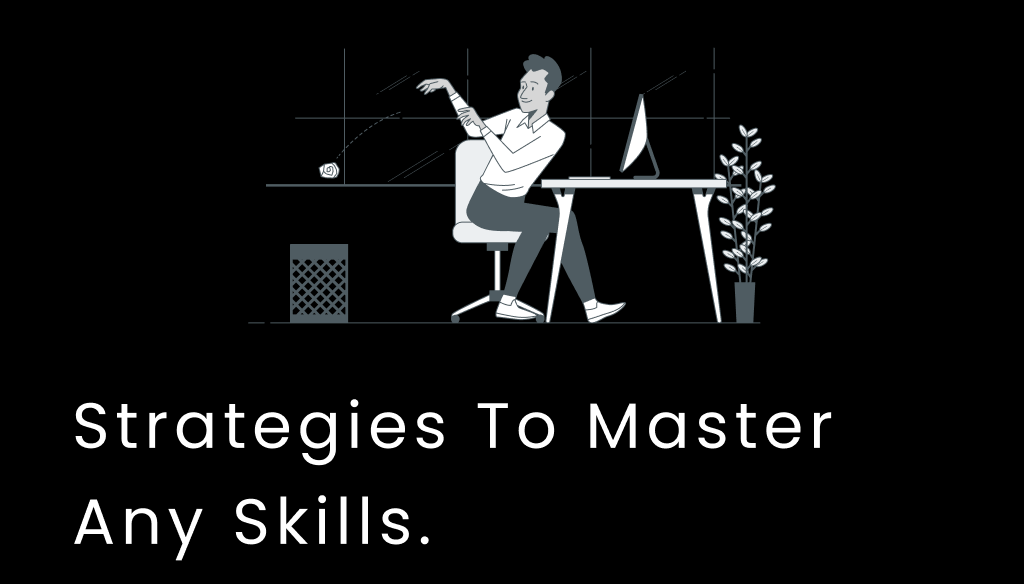These 11 best strategies will help you to learn better and remember more.
Let's start with the important question, why should you master the learning skills? The answer may be different for you but for me, I want to be able to help the world. Your answer might be to earn more, to excel in academics for all you need is
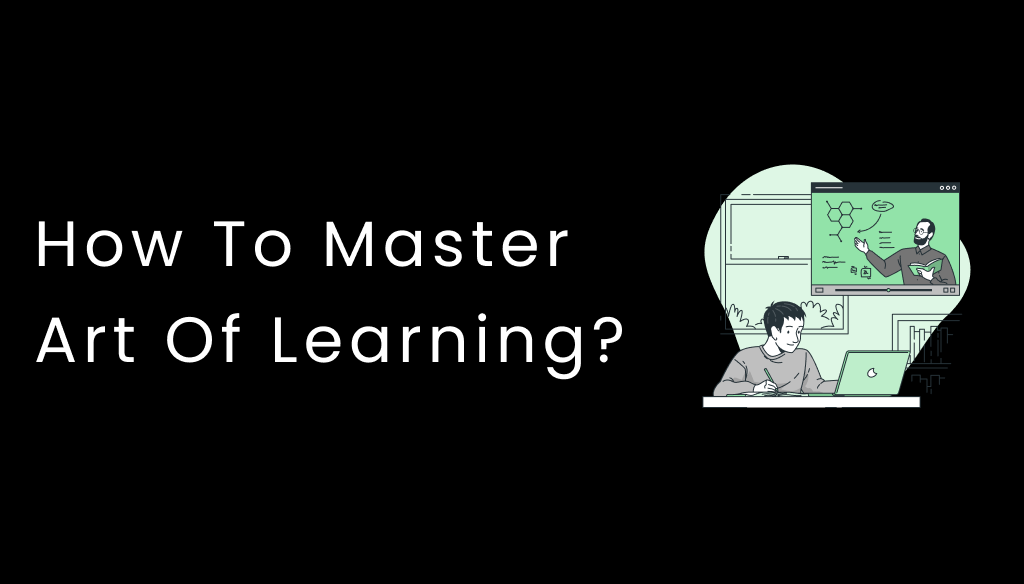
Let's start with the important question, why should you master the learning skills? The answer may be different for you but for me, I want to be able to help the world. Your answer might be to earn more, to excel in academics for all you need is a strategy, a strategy to learn better.
Here I will give you the 11 strategies that I learned throughout my academic career and also some advice that I get from others (maybe YouTube). The most effective strategy for me is teaching others who don't know.
Here is a little overview of the 11 best strategies for learning.
- Breaks and Rewards are the most important to have.
- A designated study area keeps you focused for a long period.
- Apply the concept you are learning.
- Your friends might give you a new perceptive.
- Scroll less, Sleep More.
- Capture that thought.
- Help your friend in the study.
- Book is your best friend.
- Use mnemonics to remember
- Learn Daily
Give Your Brain a Little Breaks ⌛
I cannot focus for more than 90 minutes in a row, you might face similar problems when trying to study for longer hours, so what I do is I take small breaks between those 90 minutes. You might not be able to focus for even 90 minutes but that's okay.
A study shows that the average attention span of students is between 25 and 30 minutes. You tend to feel bored after studying for about 20-30 minutes. Telling simply to study more is not going to help them improve.
To prevent burnout and give your eyes a break, it's best to take short study breaks every 30 minutes. During these breaks, you can give your brain a rest by doing something else, like taking a walk or putting your phone away. This will help you stay focused by reducing distractions.
Make breaks a part of your daily learning routine by setting a specific amount of time for learning. This break gives your brain a chance to form memories and connections.
It also allows you to clear your head and get a new perspective on your studies. Take short study breaks throughout the day, not just at the end of the day.
I suggest you follow the Pomodoro technique, Just a fancy word to say take short breaks after doing 25-30 minutes of deep work.
Give Yourself Some Rewards 🎁
Your brain loves rewards whether it is a bad or a good one, that's how children form habits.
Rewards keep you motivated to complete the task. When you have a reward system in practice, your brain knows exactly how to earn a reward.
For example, if you want to earn a reward for free time, set a certain number of questions you need to answer each day or a certain amount of time you need to spend studying. When you reach your goal, you can reward yourself with a break.
Build a system of reward mechanisms for specific goals you want to achieve.
For example, if you want to study more, set a reward system where you get a reward after studying for a specific amount of time (maybe a bite of chocolate).
This helps you remember to study and helps you build a system for learning. The secret to building a good reward system is to make it fun so that you want to stick to your system.
So how to form a good reward system?
- Try different forms of rewards for different goals.
- Consistency matters a lot
- Reward the progress not just the performance
Create a dedicated 🏫study area
Where do you get your pick focus level? For me, it is at the green table in my hostel room, not in the classroom, not in the library.
To get the most out of your study session it is important to have a place where you do only one task, study 📚. In this place, you do one thing that is study and nothing other, no eating, not scrolling the real, no playing video games. Activities like this will confuse your brain when to focus, your brain might get gaming as study and study as something dangerous.
You don't need a separate room - simply setting up a table and lamp for studying can be effective. What you need is a trigger to set your brain to focus on.
You can create a dedicated study area by decorating it to make it feel like a fun space for studying. This helps you to get into the flow of studying and helps you stay motivated to study.
Don't make bed your designated study area.
If you want to build a study area in your home or hostel (like me), you can create a section of your room where you only study. This helps you avoid distractions and gives you a dedicated area for studying.
What I do when I have to study is remove my laptop's external keyboard from the table. That's my way, you do what you like.
You are not a parrot 🦜
When I was first introduced to the school by my parents and teacher they taught me that rote is the most effective way to learn things, and they taught me to memorize the alphabet, and numbers like that. This is how our habits are formed by our dear ones in childhood. It sticks for a very long time.
When you go to high school, you realize that you cannot remember all the chemical equations and mathematical formulas and you start searching for a better way to learn. And that better way is not to be a parrot.
What you can do is use an active learning system. So what is active learning?
Active learning is a way to teach yourself by actively engaging in the learning process. Active learning aims to develop skills like critical thinking, collaboration, and motivation.
There is a difference between rote learning and active learning, and it’s important to understand these differences to help you succeed.
Rote memorization is when you memorize information by regurgitating information that another person has given you. Active learning is when you look at the world around you and use your brain to solve problems. This is the best way to learn because you are actively using your brain to understand concepts and apply them to problems.
One example of using active learning is using quizzes and flashcards while learning.
Your friends 🧑🤝🧑 are the best teachers
I learn best with my friends, it is where my ideas are formed and transformed. For me, the classroom is just a place to listen. Professors or teachers don't have much time to answer all of your crazy questions.
If you talk to friends what happens is you get yourself engaged, and you participate in the creation of thought, it is where ideas are formed.
Working in a group is not just an academic skill, it is a life skill everyone must learn to survive.
We learn best when we are creating something, and group study is a way to create thoughts.
Group study requires active participation to get the benefits from it. You cannot call it a group study if you are just listening to what other people are saying, you need to participate in the activity.
The best way to get benefits from group study is to get yourself prepare before you attend a group study session, By doing that you have some prior knowledge and you can understand and participate in the activity.
Get quality 🛏️sleep to remember more
Sleep is the most basic toolkit a student must utilize to their advantage. Most college student don't care about their sleep, but it is where maximum learning happens. If you search the internet for benefits of sleep for learning you find thousands of articles about the benefits of sleep. I am going to keep it simple.
While you are asleep, the brain builds memory connections, allowing you to better retain and recall the things you studied.
Sleep is important for your brain to process information and make memories. Many studies support that sleep improves your ability to learn, memorize, and remember new information. Quality sleep improves focus and enhances creativity.
Studies show that when students are sleep deprived, they have a hard time keeping up with their lessons and retain less information than when they get enough sleep.
A study conducted at the University of Chicago showed that students who studied for long hours were more likely to have trouble focusing and were less likely to remember the material. However, students who studied for short periods slept better, scored higher on tests, and were more likely to remember the material.
If you want to retain more information, you need to get quality sleep. This is because your brain is more likely to access your long-term memory during the morning hours.
How much do you sleep every day?
Take notes📔 to understand
You will know the importance of your notes when you have to study complex topics and you don't have enough time.
I got to see the power of note-taking myself when I got into college. In high school I never took notes, I always studied from books and it took lots of time to prepare.
Studying books in time for exams at the undergraduate level was out of the equation, I had technical books of thousands of pages. So my first experience in making notes was at the college level.
If you want to master learning, you need to learn strategically and take notes.
When you take good notes, you capture important information and can go back and review it. This is great for remembering the material and for learning.
Effective note-taking is a combination of paying attention to the material and actively using your brain to understand the material. When you take good notes, you are actively using your brain to understand the material.
When you take notes, you are simply paying attention to the material.
When you are studying, take notes by hand. This gives your brain a chance to process the information and makes it easier to recall later. Handwritten notes help you to retain more information than when you take notes on a computer.
If you love your iPad or laptop to take notes then you can do that but remember to look upon it sometimes in a while.
Teach someone to learn better
I taught some high school students in mathematics and learned one important lesson "When you teach someone, you are teaching yourself." Teaching helped me to revise my math skills.
If you want to learn a new subject, it is often helpful to teach the material to someone who doesn’t know it. This provides a way for you to actively use your brain and helps you to retain the information. Teaching helps you actively use your brain to understand the material and retain the information quickly.
Simply find someone who is not familiar with the topic you are studying and have a conversation with them. If you have younger siblings, that's where you start teaching.
One popular technique for using teaching to learn better is the Feynman Technique. It simply explains the complex topics that even a child can understand.
Books are your reliable friends
You don't want to study books at the time of exams, you need your notes, But to make notes you don't have any other better option than books.
One of the most common ways that people study is by reading books. When you read a book, you passively use your brain to process the information and remember it. This is a great way to learn but not the best.
When you study, there are other ways to use your brain to improve your memory and retention. One of these is by doing questions and answers. When you do questions and answers, you actively use your brain to understand the material and apply it to a new situation.
To gain more information from textbooks you can use a method called SQ3R. The SQ3R method is a reading comprehension technique that helps students identify important facts and retain information with the following steps: Survey, Question, Read, Recite, and Review.
The first step is to survey the passage and take in the main idea of what it is about. The second step is to question oneself about what the author wants to say in this passage. The third step is to read through the passage carefully, taking notes on any questions that arise. The fourth step is reciting aloud what has been learned so far. Finally, review all notes taken while reading through the passage.
Take the help of Mnemonics
Mnemonics can be very effective in memorizing harder concepts, I used them in my biology class. I never took a biology class in high school but it was compulsory in my college so I had no choice but to embrace Mnemonics to memorize those biological words.
The term mnemonic (from the Greek word μνημονικός, meaning "of memory") is used to describe any learning technique that aids information retention. The two most common types of mnemonics are visual and verbal.
Visual mnemonics use images and spatial relationships between words or images to create a memory link.
Mnemonics are a way of remembering things by associating the information with something else.
Make your mnemonics fun and easy to remember, If you spend all day just remembering some mnemonics we cannot call that strategists learning. If you cannot think of better ideas for mnemonics, just use Chat GPT or any other Large Language Model bots. Chat GPT can create pretty good mnemonics.
Learn Daily
If you use all the above strategies to learn and if you only study once a month then it cannot help you. You need to study daily to learn better.
You might have heard this multiple times in your life but it is a bitter truth, that I tasted in college.
Actively learning daily, improves your brain functionalities and sets learning habits.
This sounds lot of work to be done but it only takes about 30 minutes each day, imagine how much can you learn by investing 30 minutes a day for a whole year. By investing 30 minutes every day you would have invested about 182 hours by the year, which is above average in that field.
In a Nutshell
You just learned 11 important techniques that I use every day to learn anything not just in academics. If you got lost in the above techniques, here is a summary of the whole idea.
- Take short breaks in your study to prevent burnout.
- Use a reward system to trick your brain's biology.
- Implement an active learning method in your study.
- Create a dedicated study area to avoid distraction.
- Your friends can teach you better.
- Have plenty of sleep time.
- Take a lot of notes, don't copy, make notes
- Teach others who do not know.
- Make books for your new best friends.
- Use Mnemonics to remember for long.
- Study daily
If you like the above strategies then you might want to subscribe to my weekly newsletter, every week I send out a story about AI tools and productivity. It is free and you get awesome gifts when you subscribe. If you want your friends to grow like you then you know what to do.
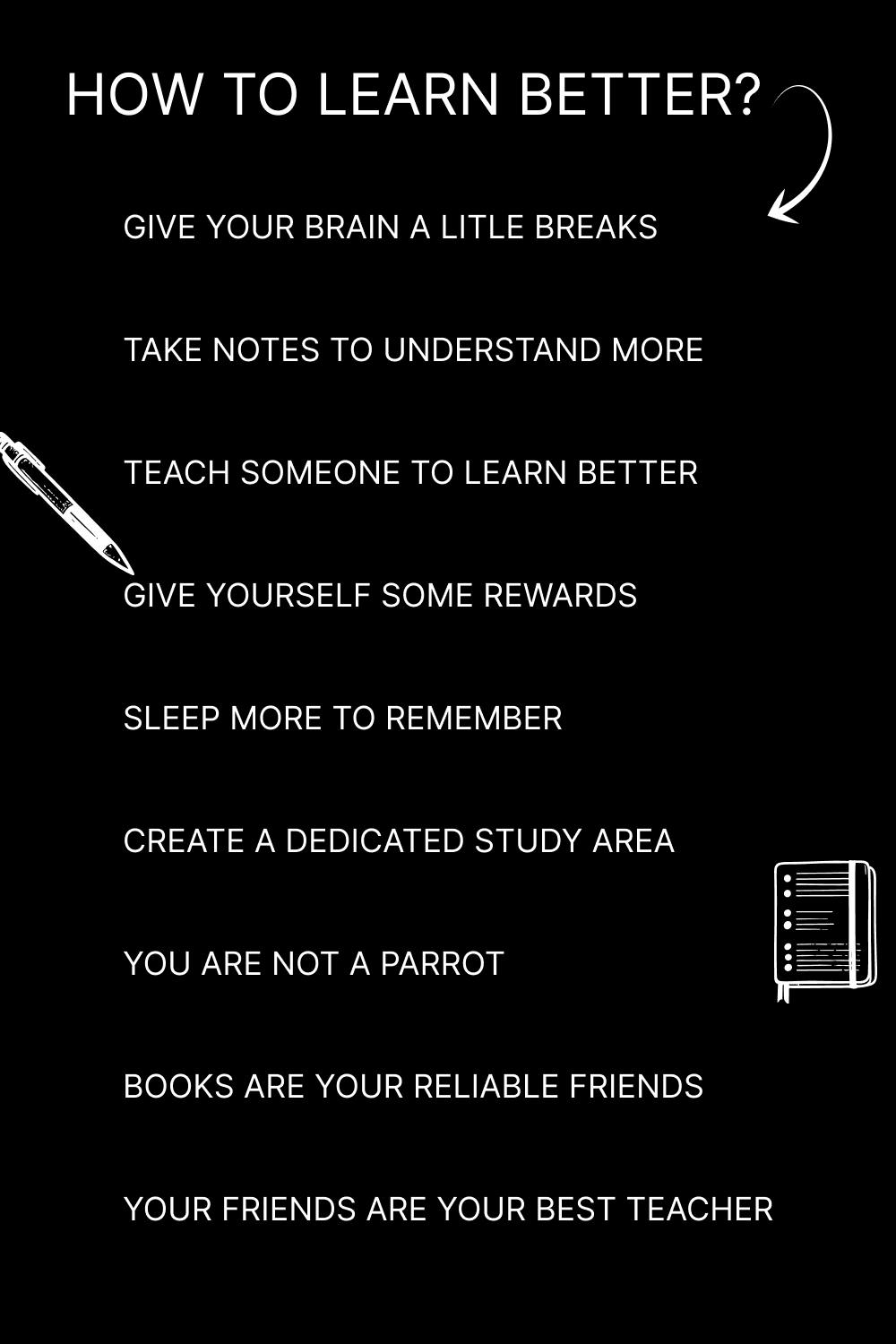
Be Bold and Confident Today: Follow These Easy Steps
Confidence is the ability to act in a way that reflects your own beliefs and opinions, even in the face of opposition or doubt. Having confidence means being able to do what you want when you want, and not letting other people’s opinions get in the way. Building your...
Dominate Your Day: The Morning Routine for Maximum Productivity
The most important habit you can develop in the morning is having a morning routine, which is a way of making your day as productive and creative as possible. Your morning routine is what decides your day. Morning is like saplings - if it is weak and unhealthy, it produces...
